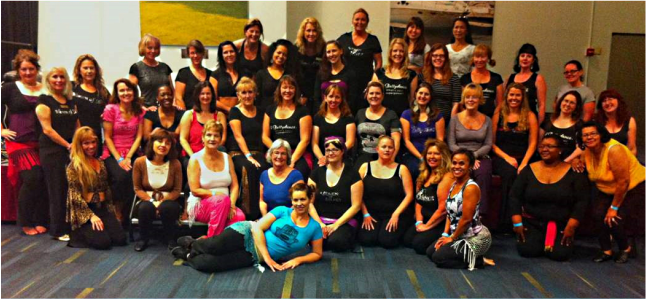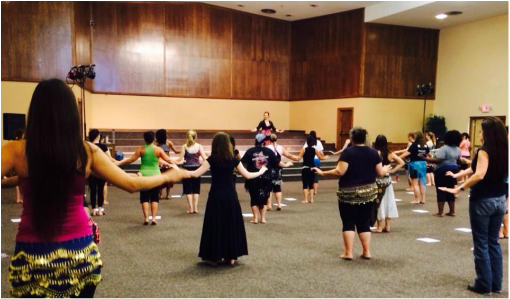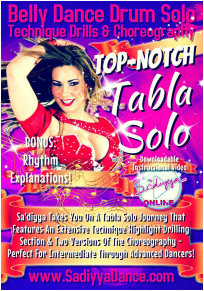How to Know When You're Ready to Teach Belly Dance Classes
"A teacher affects eternity; he can never tell where his influence stops."
-Henry Adams
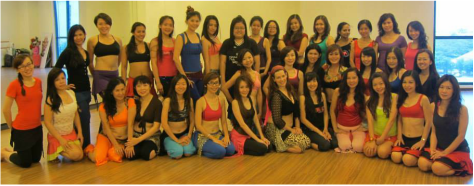 Sa'diyya teaching in Malaysia with Dance 99!
Sa'diyya teaching in Malaysia with Dance 99! -How long have you been studying the art of Belly Dance?
The length of time isn't as important as the amount and quality of information you've learned AND whether or not you have applied what you've learned to actual choreographing and performance experience.
What is the current level that you've mastered? Really MASTERED - not just checked-off a list of 2 hour workshops that you took years ago?
Try to be objective about what your level of expertise is and what you're capable of teaching. You don't have to be a pro to teach beginner classes, but having a broad foundation and years of training are going to be more beneficial to both your students and your reputation as an instructor. Different teachers excel at teaching different levels of students. To teach a beginner-level class, an instructor should be a master of at least basic advanced movement vocabulary, which includes mastery of layering multiple movements, good isolation skills and smooth transitions. In addition to executing and teaching correct technique, instructors should know the basic rhythms used in Belly Dance music, know the general abridged history of the dance, know the different styles that make up Belly Dance and the countries/cultures they come from.
-How many teachers have you had?
It's important to have a variety of techniques and styles to pull from in order to create well-rounded class formats for your students.
-Have you immersed yourself into it?
Students are going to ask questions, a lot of questions. And the more experience YOU have as a student, the better teacher you'll make.
-Do you have a repertoire of choreographies?
At some point after you have taught your students the basic movements of Belly Dance, they're going to want to learn a complete routine. Have a variety of choreographies ready to teach that represent different styles and skill levels.
-Do you have performance experience?
Teachers who have the nitty-gritty "field experience" will make better instructors. There's no way around it. Going THROUGH a variety of actual performance experiences is how you will be able to teach more than just moves. You'll be able to teach performance skills and, if you're a regularly working professional performer, you'll be able to pass on business skills, too.
"A good teacher, like a good entertainer first must hold his audience's attention,
then he can teach his lesson." -John Henrik Clarke
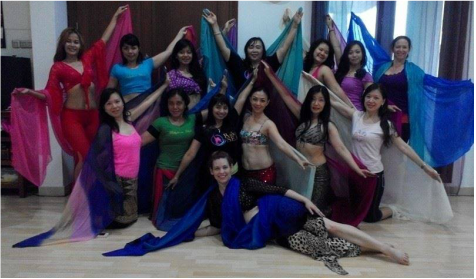 Participants in Sa'diyya's workshop - Sponsored by Christine Yaven in Jakarta, Indonesia
Participants in Sa'diyya's workshop - Sponsored by Christine Yaven in Jakarta, Indonesia Most first-time teachers will copy what they learned from their main teacher and teach the same moves the same way they learned them. It's important to give credit to your teacher for the things you're sharing which are specifically from her/him. And beyond that, you should try to come up with your own ways of teaching that will be special and unique to you!
-Are you comfortable with public speaking?
That's what teaching is: Public Speaking. If you're not comfortable with that, teaching may not be for you (or maybe teaching private lessons will work!) You should let your personality shine as an individual and be upbeat and keep the energy high as you direct your classes.
-Are you familiar with basic human anatomy and do you know how to teach physical movement to avoid injuries?
This is super important! You need to know the major muscle groups and how they move. Do some research if you don't know about the basic skeletal and muscular systems. As a qualified instructor, you also need to know how to teach without injuring anyone! Encourage students to learn body awareness and to know their own physical limitations. And make sure you have useful warm ups and cool downs incorporated into your lesson plans.
-What do you hope to gain from the teaching experience?
Why do you want to teach? For notoriety? For comradery? For paid exercise? Know your intentions and remember if you make your students' experience a priority, your experience will be more satisfying, too!
-What do you hope to share?
Do you want to create performance experiences for novice students? Do you want to share your love of Middle Eastern music with students? Do you want to encourage an active lifestyle for people? Have a mission and go for it!
-Do you have a venue to teach classes?
Obviously ;) you'll need a nice place to teach your classes. Try to find a dance studio or gym that's willing to work with you to create a win-win situation. Also, a studio with clean floors that are free of debris, and an easily accessible sound system that has really good clarity is ideal. Is the location central and is parking an issue? Maybe your home will work?! Do you have a large space and mirrors?
-Do you have a thought-out, organized lesson plan?
It's also very important to prepare for your classes ahead of time. Don't just show up without a plan. People are paying money and using their time and energy to take a class from YOU. Take it seriously and put a lot of thought into your work. Make sure your lesson plan fits the level of students you're teaching. And double check the class description to ensure that you really do cover everything that was advertised.
-Do you know what to charge, how to advertise and how to keep your student enrollment organized?
Find out from other local instructors what the rates are for your area. What's the drop in rate? The session rate? How are you going to reach potential students? Will the venue where you're teaching also help advertise your classes? Do you have a website to advertise your services? Consider using an electronic newsletter service to send updates to email addresses that you've collected from students.
-Ready for teaching advanced classes, directing a troupe or even being a workshop instructor?!
Depending on your skill/experience level, you may reach a point where your student base grows and you have students seeking further training. If you are qualified, go for it! If not, be confident sending them to another instructor who offers more advanced classes. A teacher of advanced levels should be able to teach what we covered above plus improvisational dancing, music theory, folkloric dances, a variety or props, performance skills, abstract concepts and more!
As far as directing a troupe, you can offer troupe performance opportunities for multiple skill levels of students. You can have a student troupe who perform at haflas and festivals. You can even create a professional troupe if you can create lively, entertaining group choreographies with advanced dancers. For a professional troupe, you'll need to have experience on the business end of Belly Dance so you can book paid performances for your group.
And what about being a workshop instructor? Teaching longer, more intense workshops, often times to a larger group with varying skill levels in one room, is very different from regular ongoing classes. It's ideal to have the experience of teaching weekly classes. That's where you hone your teaching skills! It's where you create a keen eye for correcting students' technique and it's where you get comfortable speaking in front of/directing a group of people. It's also where you really master your teaching "vocabulary" so you'll be better equipped to teach more efficiently in a more intense setting. Get experience with smaller, ongoing classes before venturing into teaching dance workshops. It will give you more credibility if you have all that teaching and performing experience under your belt. Take it slow and do it right!
"The art of teaching is the art of assisting discovery."
-Mark Van Doren

